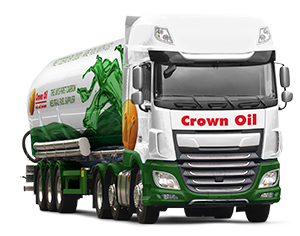An In-depth Comparison Between HVO Fuel and Biodiesel
Businesses and consumers alike have started looking for more sustainable fuel solutions such as HVO fuel and biodiesel as the world moves towards a greener future. While both fuels come from organic feedstocks, they do have many practical differences. That’s why we’ve put together a HVO and biodiesel comparison to break down the benefits and use cases of each.

Why do sustainable fuels matter?
A recent study carried out by Deloitte found that 28% of consumers believe that responsibly sourced or harvested goods are a consideration when making a purchase. It is therefore crucial for businesses to adapt their operations to cater to changing consumer trends. Sustainable fuel solutions can significantly reduce the net emissions of business operations and therefore make your business more attractive to new consumers, as well as reducing your overall carbon footprint.
Second-generation renewable fuels offer one of the most rapid and economically viable routes to reducing GHG emissions for the commercial sector because they require no modifications to engines or equipment. They are and will continue to be an available and flexible resource to deliver immediate savings in all road vehicles and machinery.
Using a low-carbon fuel will help demonstrate your commitment to reducing climate change whilst reducing your carbon footprint.
What is the difference between biodiesel and HVO fuel?
Biodiesel also known as FAME diesel (Fatty Acid Methyl Ester) is a first-generation biofuel. To help reduce harmful emissions, biodiesel is added to all road transport diesel to meet the UK Government’s Road Transport Fuel Obligation (RTFO).
HVO (Hydrotreated Vegetable Oil) is a second-generation biofuel that is produced from 100% renewable waste materials which can cut up to 90% net CO2 emissions and significantly reduce particulate matter (PM) and nitrogen oxide (NOx) emissions.
HVO fuel benefits vs biodiesel
HVO is a second-generation, more innovative fuel solution and has a range of benefits over biodiesel including:
- A 100% fully renewable drop-in diesel alternative
- Consistent product
- Lower maintenance costs due to less risk of degradation
- Less storage concerns (10-year shelf life)
- No heating required during storage
- Far greater resistance to gelling in cold temperatures
- Can be mixed in all proportions with regular diesel

Get in touch with our fuel experts today on 0330 123 1444 if you would like to learn more about ordering HVO.
How are biodiesel and HVO sourced?
How is biodiesel (FAME) made?
Biodiesel is manufactured through the transesterification of natural oils or fats with methanol (and sometimes ethanol) to produce biodiesel and glycerol.
UK biodiesel is produced from predominantly waste-based raw material. To reduce the environmental impact of fossil fuels, biodiesel is included in fossil diesel as a small percentage which is being increased every year by the government. However, for fuel to meet the common diesel standard EN590, no more than 7% of FAME or UCOMe can be added.
How is HVO fuel made?
HVO is manufactured through the hydrotreatment of waste vegetable oils and fats. During this process, hydrogen removes oxygen from vegetable oil molecules and splits them into separate hydrocarbon chains equivalent to those found in conventional fossil diesel. The resulting fuel is functionally identical to diesel, meaning that HVO can be used as a direct, drop-in alternative.
All HVO must meet the European Standard EN15940; our HVO meets EN 15940:2016 and ASTM D975 specifications.
Does HVO come from palm oil?
Not all HVO is created equal, some forms of HVO can be manufactured from palm oil, however, this is not the case with the HVO fuel that we supply. Our HVO product is ISCC verified at import and assured through the Renewable Fuel Assurance Scheme (reference number CO/P8/21), therefore we are able to provide a clear history and breakdown of derivation of raw material collection through to final HVO delivery, ensuring no palm oil is present.
Crown Oil does not support the sale or use of palm oil-derived HVO and only supplies ISCC verified waste-derived products into the market.
Is HVO fuel a biodiesel?
HVO is often confused with FAME-based biodiesel but a significant difference is that HVO is in fact a fully renewable diesel, rather than a first-generation biodiesel.
HVO doesn’t contain the harmful components of fossil diesel (such as aromatics) and is made from 100% renewable feedstocks instead of crude oil.
HVO is FAME-free and 100% renewable hydrocarbon, so it has none of the performance problems that first-generation biofuels face such as stability issues when exposed to water and fungal/bacterial attack. As a synthetically produced product, HVO’s molecules are consistent and uniform, providing assurance that you will receive a quality, consistent product. This provides excellent performance compared to regular biodiesel and offers a shelf life of up to 10 years if stored correctly.
Learn more in our HVO fuel FAQs.
What are the environmental differences between HVO fuel and biodiesel?
What are the environmental advantages of biodiesel over diesel?
B7 diesel found at fuel pumps does contain up to 7% added biodiesel thanks to its positive effects on reducing greenhouse gas emissions. Waste-based biodiesel as produced in the UK achieves much higher savings than crop-based biodiesel. Our biodiesel sees a significant reduction in particulates (soot) when burnt.
How does HVO fuel reduce net CO2 emissions?
HVO is 100% biodegradable, sustainable and renewable. Powering engines and vehicles with HVO reduces up to 90% of net CO2 emissions, up to 27% of NOx emissions and up to 84% of PM emissions, all which are key components to improving air quality.
- Crown HVO has been accepted by the Renewable Fuel Transport Obligation (RTFO)
- Crown HVO is a Renewable Fuels Assurance Scheme approved fuel, conforming to the RFAS requirements
- Each import of Crown HVO is accompanied by Proof of Sustainability issued by an approved third-party
- HVO fuel meets the requirements of the Renewable Energy Directive
- Crown HVO fuel undergoes multiple extensive audit processes to ensure both sustainability and product integrity are ensured
HVO fuel offers a renewable lifecycle and therefore contributes far less to the CO2 concentration in the atmosphere.

Environmental verdict
While both fuels see a reduction of net emissions when compared with regular diesel, HVO fuel sees a far greater benefit. We run our entire delivery fleet on HVO fuel to reduce the net emissions of our fuel deliveries by up to 90%. This contributed towards us becoming the first UK fuel distributor to be certified carbon neutral in line with PAS 2060:2014 standards in 2022, which has now been replaced by the ISO 14068-1 standards in 2025.
Visit our carbon calculator page to see how much CO2 you could save when switching to HVO!

How will biodiesel and HVO fuel affect your operations?

How can biodiesel affect your operations?
Biodiesel suffers from the same effects as regular diesel during the cold winter months. You may also be required to install specialist upgrades for your equipment or diesel engines.
To avoid performance issues, biodiesel requires more management and monitoring when in storage due to the FAME content; it can absorb atmospheric water, which can lead to sludge buildup and a reduction in stability over time. When left in storage for a prolonged period of time, biodiesel can start to damage equipment, machinery and diesel engines.
Switching to HVO fuel from diesel
While biodiesel encounters some of the same problems as regular diesel, HVO is a drop-in diesel alternative that does not suffer from these effects. HVO is FAME and fossil-free and therefore has a far greater resistance to gelling and sludge build-up during cold temperatures.
HVO fuel’s year-round performance gives it a much longer storage lifespan of up to 10 years. As HVO is a true drop-in diesel alternative its use will have no impact on the operations of your business.
Make the switch to HVO today by calling 0330 123 1444

Operations verdict
If you wish to store your fuel for prolonged periods of time, then HVO fuel is the clear choice because of its zero bio content and greater resistance to gelling during the winter months.

Are HVO fuel and biodiesel compatible with your machinery and engines?
Biodiesel compatibility
Some OEMs warrant new vehicles for B20 and B30 blends of biodiesel as long as the fuel complies with EN16709 & EN14214.
OEMs can install certain parts while manufacturing vehicles to allow them to run on high blend biofuel, or retrofit them where these components weren’t originally fitted. Fleet operators should therefore query which biofuel blends new vehicles are warrantied for before switching.
If fleet operators wish to run on B100 biofuel, suppliers can install upgrade packages to certain engine types to include heated fuel tanks.
HVO fuel compatibility
Large numbers of OEMs approve HVO for use in their vehicles as long as the fuel meets European Standard EN15940.
Compatibility verdict
This will be completely dependent on the equipment and engines that you use for your business.
Want to check which fuel is compatible for your business? Give our fuel experts a call today on 0330 123 1444
Are biodiesel and HVO fuel widely available?
Where can you buy biodiesel?
Biodiesel is widely available across the UK and we supply it to a wide range of businesses.
Is HVO fuel available in the UK?
Yes! Although HVO fuel is a fairly new product in the UK, which initially caused slow uptake, an increasing number of industries are switching to HVO as they recognise the undeniable benefits of the fuel. We are proud to be one of the UK’s largest suppliers of HVO fuel with vast stock on site. We have even switched our entire fleet over to HVO fuel, the advanced renewable diesel.
In Finland, Sweden and several European countries, HVO has been available at the pump for a number of years already. Finland saw its potential and introduced excise duty relief to help drive adoption rates which is now being phased out as the market has expanded to the point where it’s self-sustaining.
Availability verdict
Biodiesel is more widely supplied however, both fuels are readily available across the UK.
We supply both biodiesel and HVO fuel. If you would like to secure your fuel, you can call our fuel experts today on 0330 123 1444.
Is there a difference in price between HVO fuel and biodiesel?
How much does biodiesel cost?
The cost of switching to biodiesel can go beyond the price of the fuel if your equipment is not compatible. For B100 use, vehicles require a conversion to include a simple system to warm the fuel and avoid gelling. As for the cost of the fuel itself, typically the higher the blend of biodiesel, the lower the cost of the fuel.
Biodiesel requires regular fuel testing and tank inspections to avoid engine problems and clogged filters. This means that the maintenance costs of biodiesel can begin to stack up over time. In addition, biodiesel blends up to B30 can be stored and used in existing diesel infrastructure. B100 must be kept at a certain temperature to avoid gelling during the winter. This will result in some heating costs.
The costs of HVO fuel
The fuel itself is typically more expensive than biodiesel and regular diesel however, HVO can save your business money over the long term as it will require less maintenance as there is less risk of degradation in the fuel tanks.
HVO does not require specialist equipment or infrastructure and is a true drop-in replacement for regular diesel.
Costs verdict
If you can stretch your budget slightly, HVO fuel can save your business money if you plan to store your fuel long-term. If you are looking for a short-term fuel solution, biodiesel may be suitable for you providing that the fuel is not being stored over the winter.
If you are still unsure which fuel is right for your business or have any further questions about HVO fuel or biodiesel. You can call our fuel experts on 0330 123 1444 to discuss your options and get your questions answered.





